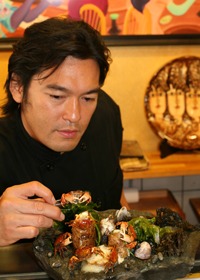Sushi chef Bun Lai may just be the most sustainable chef out there. Bun, who grew up in Connecticut and spent much of his time at the beach, is now the owner of Miya's, the top sushi spot in New Haven.
But this story isn't about enterprise; Miya's is not your conventional sushi restaurant and how Lai put his sushi spot on the map is what will really blow you away.
Bun had always been a proponent for sustainability and eating the right food and for the right reasons, but one day along the Long Island sound, Bun took this to a new level. He and a friend were flipping rocks and looking for the little green crabs he had grown custom to from his youth, when he stumbled upon something new...something different. Bun Lai found a crab he had never seen before and peaked by his curiosity, he decided to take this specimen back home with him and do a little research. As it turns out, Mr. Lai came across the Asian shore crab, one of the many invasive species that plague or society and cost our government close to $120 billion in damages. So what did Bun do?
Well, most people wouldn't have been as curious as Bun and probably would have just ignored this new crab, but Bun is not like everyone. He found something he was not accustomed to and, after doing some research, he figured out a way to put this problem crab to good use. Lai excavated the meat from the crab and added it to a new sushi roll he called the Kanibaba, which is now his restaurants biggest hit.
Bun Lai has found a way to kill two birds (er, crabs) with one stone. Not only does he help get rid of an invasive species that is damaging a delicate ecosystem, he also makes a delicious dish that is loved by the people of New Haven. It's both profitable and environmentally friendly. This is sustainability in its purest form.
Bun Lai is not content with only one sustainable dish, and he has continued to push the envelope in terms of turning a negative into a positive. Lai uses the Dead Man's Fingers, an invasive seaweed, as the base of his very popular Miso soup. Bun Lai's choice to use local invasive species as items on his menu, while doing away with traditional fish such as tuna, eel and shrimp, is a very progressive move that is paying off. Hopefully Bun will serve as an inspiration for other chefs who want to push into new frontiers of sustainable dining.
